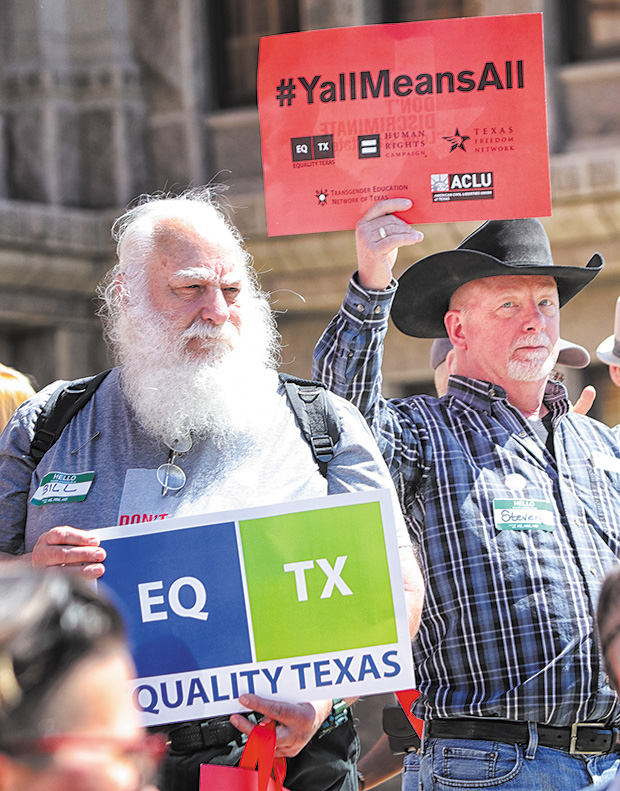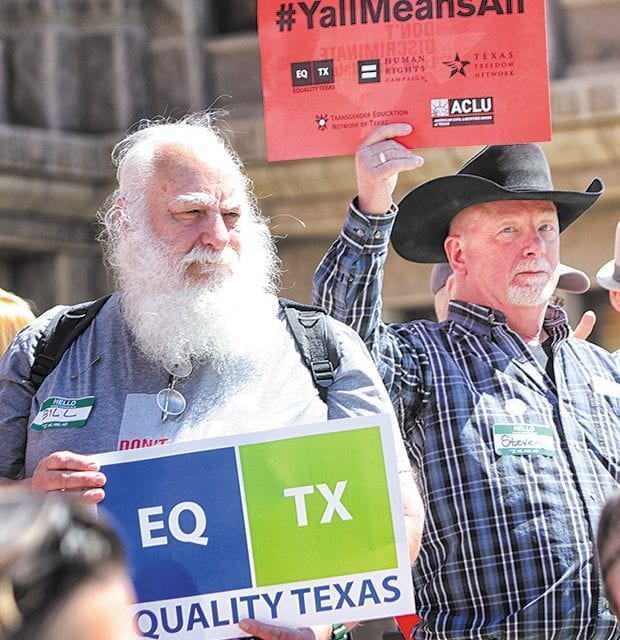Since 2003, the LGBT community has made huge strides, but maintaining those rights will take vigilance

LGBT advocates and allies turned out in force for Advocacy Day, sponsored by Equality Texas and other progressive organizations on March 20, gathering for a rally on the steps of the Texas Capitol. Equality Texas CEO Chuck Smith has called on advocates to keep speaking out against bathroom bills and other discriminatory legislation as Texas lawmakers prepare for a special session starting July 18. (Tammye Nash/Dallas Voice)
DAVID TAFFET | Senior Staff Writer
taffet@dallasvoice.com
This week, the U.S. Supreme Court issued a ruling overturning an Arkansas law that allowed a non-biological opposite-sex father to be listed as a parent on birth certificates, but did not allow a same-sex spouse to be listed as a parent.
The ruling came down on June 26 — Marriage Equality Day.
On the same day in 2015, the Supreme Court issued its ruling that extended same-sex marriage throughout the U.S. Two years before that, it paved the way with the Windsor decision that ruled part of the Defense of Marriage Act illegal. And in 2003, Lawrence v. Texas paved the way for Windsor by declaring sodomy laws unconstitutional.
Progress on LGBT equality had almost come to be expected. But in this current, regressive political climate, could some of those rights be rolled back?
Nick Morrow is Human Rights Campaign’s press secretary for the southern states. He said LGBT advocates have to stay alert, and keep LGBT equality on the front burner.
“One of the most impactful things you can do is make sure legislators know what you oppose and what you favor,” Morrow said. “Make as many contacts as possible.”
That’s on a national, state and local level. Right now, Morrow said he is worried about the upcoming special session of the Texas legislature, the agenda for which includes yet another “bathroom bill” that would prevent transgender people from using the appropriate public restroom facilities and could also include language repealing local nondiscrimination ordinances that go beyond state and federal protections.
“Anti-trans legislation is extremely dangerous for trans Texans,” Morrow said, adding that fighting such legislation is important for the entire LGBT community, including straight allies.
First, he said, is the economic damage laws like these cause. California has already banned state-funded travel to Texas because of the anti-LGBT adoption law passed this year by the legislature. But potential damage to Texas’ reputation is another reason to avoid passage of a bathroom bill. North Carolina, despite a half-hearted repeal of its bathroom bill, is still dealing with travel bans and a hit to its reputation that just won’t go away.
Morrow called the anti-transgender legislation just an entry point for attacks on a broad range of civil rights for LGBT people. “It’s a way to undermine LGBTQ rights as a whole,” he said. “After marriage equality, we saw an uptick in anti-LGBT bills as a reaction to the ruling.”
On a federal level, Morrow said, the Equality Act is a priority, because there’s still no federally-based legal recourse for those who might get married on Sunday and get fired on Monday for being LGBT.
But HRC’s strategy is to fight for equality at all levels of government. In Mississippi, he pointed out, Jackson and Magnolia both passed nondiscrimination ordinances over the past year.
HRC has teamed with Equality Texas and several other organizations including the Transgender Education Network of Texas, the ACLU and Texas Freedom Network to derail the bathroom bill and other proposed laws that remove the ability of cities to create their own ordinances during the legislature’s regular session, and will continue to do so during the special session.
Equality Texas Executive Director Chuck Smith said he also worries about proposed religious refusal legislation. “Using religion to discriminate is the new frontier,” he said. “The Supreme Court is likely to address it.”
In the mean time, the legislature is likely to allow it.
Smith believes the Supreme Court will rule against these religious refusal laws and said there’s a body of lower court rulings “making accurate distinctions” between what’s true religious freedom and what’s not. He said we must ensure the ability of people to practice their faith without infringing on other people’s rights.
His advice to LGBT Texans is similar to Morrow’s: “This summer, we need to be as loud and visible as possible during the legislative session. We can’t use summer as an excuse not to be vocal.”
Smith said he isn’t sure what the new bathroom bills would look like, but the House and Senate both have sponsors lined up. He said there might even be multiple versions of the bills.
Because the session lasts only 30 days, Smith said he doubted the bills would get hearings in both houses of the legislature. But when there are hearings, he said, he needs people to show up.
And, he said, constituents need to start contacting their legislators as soon as this week.
Resource Center Communications and Advocacy Manager Rafael McDonnell agreed.
“We need to be ready to push back and push back hard and with a loud voice,” McDonnell said. “Think your voice doesn’t count? It does.”
Just this week, the Dallas City Council listened when the LGBT community pushed back against the nomination of former City Councilwoman Vonciel Jones Hill to serve on the board for the Dallas Area Rapid Transit. During her eight years on the council, Hill opposed anything and everything positive toward the LGBT community. After current councilmembers heard the opposition to her nomination to the DART board, not a single one — not even the two that nominated her — voted for her to be appointed.
McDonnell said the next term on the U.S. Supreme Court could be very interesting. The court has already agreed to hear the case of a Colorado baker who refused to bake a cake for a same-sex couple and may take a case challenging a Mississippi religious freedom law.
The case of transgender student Gavin Grimm’s lawsuit over bathrooms at his public school has been remanded to the Fourth Circuit. If either side appeals that court’s findings, it could end up back in the Supreme Court next session.
Different circuits have already issued varied rulings on whether sexual orientation or gender identity are already covered by U.S. law as sex discrimination. That poises any of those cases to be heard by the court.
Two justices that have been allies to the LGBT community are aging and an appointment of one conservative justice could end progress made through the courts.
As bathroom bills continue to be debated, Lambda Legal Dallas-based attorney Paul Castillo filed a case this week against the St. Johns County School District in Florida for shaming a 16-year-old trans student into using a separate bathroom.
While legislatures debate hiding discrimination behind religious liberty arguments and hurting trans kids by regulating bathroom use, suing for equal rights has been successful.
Lambda Legal hopes that the new case in Florida and Gavin Grimm’s case in Virginia will set precedent that trans students must be treated fairly.
Among the other landmark cases Lambda Legal filed is one related to elder abuse in a nursing facility in Illinois and is involved in cases relating to housing, immigration, employment, healthcare and other issues.
Achieving equality in all of these areas will be slow and arduous.
“We need to be vigilant,” McDonnell said.
This article appeared in the Dallas Voice print edition June 30, 2017.

